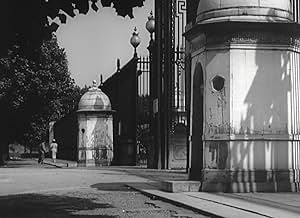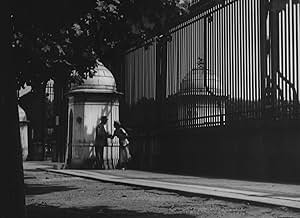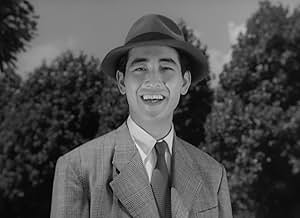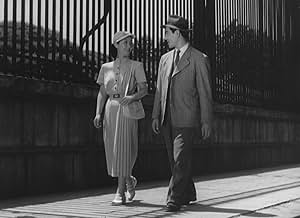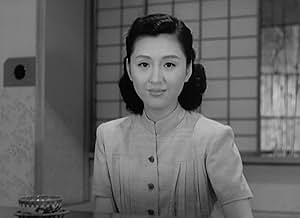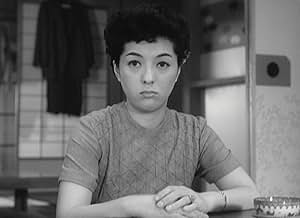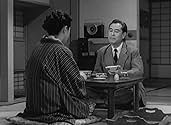AVALIAÇÃO DA IMDb
7,6/10
4,1 mil
SUA AVALIAÇÃO
Um casal de meia-idade sem filhos enfrenta uma crise conjugal.Um casal de meia-idade sem filhos enfrenta uma crise conjugal.Um casal de meia-idade sem filhos enfrenta uma crise conjugal.
- Prêmios
- 1 vitória no total
- Direção
- Roteiristas
- Elenco e equipe completos
- Produção, bilheteria e muito mais no IMDbPro
Avaliações em destaque
Ozu marriage stories are one of the best ones. He really hits you with his deep and truthful dialogues. I loved the cinematography and the use of shadows. Also, I got hungry watching this.
This is both typical and untypical Ozu - typical in that its a simple story with a typical simple point (but of course told with deceptive skill and complexity), but its unusual in that its set among the upper middle classes, not the 'average' Japanese family of most of his movies.
The story is straightforward - an unhappy marriage between a rich girl and her successful but relatively low born husband. She can't hide her contempt for his dullness and rustic ways. He is unhappy but never argues back, just finds his own little ways of getting pleasure out of life. A series of incidents finds them having an unexpected late night simple meal (green tea over rice is essentially 'leftovers' when nothing else is available) and suddenly she realizes she loves him after all.
As always with Ozu, the richness is in the characters. Taeko, played by Michiyo Kogure is spoiled and insensitive, but a compelling, capricious character. Mokicho (the husband) under his dull salary-man skin is really a sensitive, caring man. The other characters are all vivid and memorable, especially Setsuko, the headstrong niece. There are also wonderful set pieces, usually involving Taekos friends, having little girls nights together, gossiping about their husbands and plotting marriages.
With Ozu a brief overview of his movies always makes him sound dull. But in reality this is funny, moving and compelling. Its not first rate Ozu - the theme of the movie is too straightforward and obvious, the ending a little too neat and tidy. But second rate Ozu is still head and shoulders above almost any other drama. The humanity of the characters shines through, creating a little world we can sink into. The wonder of Ozu is that we are not observing characters, we are sitting with them, in the middle of their lives.
I can't help but compare this to Naruse's 'Repast', another movie about a marriage in trouble, where the wife cannot hide her contempt for her husband, but in the end they both realize why they love each other. Naruse was more of a pessimist, so the reconciliation at the end of Repast is both happy and sad, as the characters realize that that living together, even without a great love, is better than being lonely. In Ozu's more traditional world, the couple (product of an arranged marriage) eventually find love, even after many years of marriage by the acceptance of each others little foibles. Taeko learns that simple things can be as pleasurable as luxury. It seems a little trite, and it would be in another film makers hands, but somehow Ozu finds depths of wisdom even in such clichés.
The irony is that Ozu was a lifelong bachelor, yet he made perhaps the best movies ever made at examining families in detail. If I had my way I'd put this movie and 'Repast' as compulsive viewing for all engaged couples. It would be more effective than any pre-marriage course!
The story is straightforward - an unhappy marriage between a rich girl and her successful but relatively low born husband. She can't hide her contempt for his dullness and rustic ways. He is unhappy but never argues back, just finds his own little ways of getting pleasure out of life. A series of incidents finds them having an unexpected late night simple meal (green tea over rice is essentially 'leftovers' when nothing else is available) and suddenly she realizes she loves him after all.
As always with Ozu, the richness is in the characters. Taeko, played by Michiyo Kogure is spoiled and insensitive, but a compelling, capricious character. Mokicho (the husband) under his dull salary-man skin is really a sensitive, caring man. The other characters are all vivid and memorable, especially Setsuko, the headstrong niece. There are also wonderful set pieces, usually involving Taekos friends, having little girls nights together, gossiping about their husbands and plotting marriages.
With Ozu a brief overview of his movies always makes him sound dull. But in reality this is funny, moving and compelling. Its not first rate Ozu - the theme of the movie is too straightforward and obvious, the ending a little too neat and tidy. But second rate Ozu is still head and shoulders above almost any other drama. The humanity of the characters shines through, creating a little world we can sink into. The wonder of Ozu is that we are not observing characters, we are sitting with them, in the middle of their lives.
I can't help but compare this to Naruse's 'Repast', another movie about a marriage in trouble, where the wife cannot hide her contempt for her husband, but in the end they both realize why they love each other. Naruse was more of a pessimist, so the reconciliation at the end of Repast is both happy and sad, as the characters realize that that living together, even without a great love, is better than being lonely. In Ozu's more traditional world, the couple (product of an arranged marriage) eventually find love, even after many years of marriage by the acceptance of each others little foibles. Taeko learns that simple things can be as pleasurable as luxury. It seems a little trite, and it would be in another film makers hands, but somehow Ozu finds depths of wisdom even in such clichés.
The irony is that Ozu was a lifelong bachelor, yet he made perhaps the best movies ever made at examining families in detail. If I had my way I'd put this movie and 'Repast' as compulsive viewing for all engaged couples. It would be more effective than any pre-marriage course!
Ozu continues to unfold a worldview of melancholy joy. Here we are offered an insight of what informs this: the glum husband wants things that are 'intimate, primitive, familiar and relaxed', from his brand of cigarettes to pouring tea over his dinner of rice.
So it seems Ozu gravitates towards his camera and world not from deep introspection or need for formalism but towards an intuition.
The benefit is that he naturally envelops space. He doesn't construct it, each visual scene is a soft pencil-stroke tracing and re-tracing paths as a way of arriving at shape.
Some kind of life emerges. In the scenes of the wife lounging with her friends in a spa around a table with drinks and then lazily feeding the fish in a pond, or the two army buddies reminiscing about a beach in Singapore during war with its palm trees, a melancholy breeze blows through it carrying sense, life, contact, memory, evocation. Individually there are wonderful visual moments here, some of the best in his films.
(In all this, he's in line with the great tea master Rikyu's instructions about serving tea, whose name appears in the film. It should not be a lavish or formal ceremony, but sparse and intimate, looking for spontaneous appreciation of what two people relaxing in each other's presence can inspire. Serving tea is merely the opportunity, the framework for contact.)
The flipside of that intuitive approach is that it's enough for Ozu to sketch as he goes. The idea is that life is a bit like this, apparent only in retrospect. He does have in mind a larger transition: a marriage that has grown cold and distant, the lonely night of breaking them apart and, as the man's flight is unexpectedly cancelled, their coming together again in the empty house.
This is a great great notion, the idea that you can create an entire life and for this to slowly crystallize realization in a single moment between two people. It resembles more clearly than any of his other films where Cassavetes would take this mentality in his Woman.
Ozu had tried this several times. For whatever reason, probably a rushed production, he's not in control of it here. This is the most disjointed of his films, a real mess. The ending is possibly the worst work Ozu has done, the wife now enlightened about the purpose of marriage explaining to the young girl (and through her to young women in the audience).
So it seems Ozu gravitates towards his camera and world not from deep introspection or need for formalism but towards an intuition.
The benefit is that he naturally envelops space. He doesn't construct it, each visual scene is a soft pencil-stroke tracing and re-tracing paths as a way of arriving at shape.
Some kind of life emerges. In the scenes of the wife lounging with her friends in a spa around a table with drinks and then lazily feeding the fish in a pond, or the two army buddies reminiscing about a beach in Singapore during war with its palm trees, a melancholy breeze blows through it carrying sense, life, contact, memory, evocation. Individually there are wonderful visual moments here, some of the best in his films.
(In all this, he's in line with the great tea master Rikyu's instructions about serving tea, whose name appears in the film. It should not be a lavish or formal ceremony, but sparse and intimate, looking for spontaneous appreciation of what two people relaxing in each other's presence can inspire. Serving tea is merely the opportunity, the framework for contact.)
The flipside of that intuitive approach is that it's enough for Ozu to sketch as he goes. The idea is that life is a bit like this, apparent only in retrospect. He does have in mind a larger transition: a marriage that has grown cold and distant, the lonely night of breaking them apart and, as the man's flight is unexpectedly cancelled, their coming together again in the empty house.
This is a great great notion, the idea that you can create an entire life and for this to slowly crystallize realization in a single moment between two people. It resembles more clearly than any of his other films where Cassavetes would take this mentality in his Woman.
Ozu had tried this several times. For whatever reason, probably a rushed production, he's not in control of it here. This is the most disjointed of his films, a real mess. The ending is possibly the worst work Ozu has done, the wife now enlightened about the purpose of marriage explaining to the young girl (and through her to young women in the audience).
Another sensitive Ozu film about family. In this one, a somewhat upper-class woman resents her more simple, middle-class husband (by arranged marriage), while also encouraging her niece to go to arranged marriage meetings. As always with Ozu, I found an awful lot to like about this movie, but I wasn't quite enamored enough to gush over it. Most of the core cast is superb, although it's not Ozu's usual team (Setsuko Hara is nowhere to be seen, although Chishu Ryu and Chikage Awashima have minor roles). Michiyo Kogure might be a little too nasty, but I have to say it's kind of refreshing to see a less restrained character in an Ozu film. Perhaps the film wraps up too nicely and neatly, going too obviously for a touching moment, but I wouldn't say it's entirely unwarranted. At any rate, I enjoyed the film with its insights and gentle humor.
Japanese master Yasujiro Ozu made this 1952 film between two masterpieces, Early Summer and (especially) Tokyo Story, and this film suffers a bit by comparison with them. As in other (somewhat more accomplished) movies by Ozu (one thinks especially of the superb Late Spring) the plot deals on the issue of whether a young woman should marry, and if that marriage should be a love marriage or arranged one. There is a middle aged, childless couple, the snobbish, nasty Taeko (Michiyo Kogure) and her husband, the honest, good but a bit dull salary man Satake (Shin Saburi). Her nephew, the pretty young Setsuko (Keiko Tsushima) comes to visit, she has to go to an interview for an arranged marriage, but seeing the loveless marriage between Taeko and Satake, and how she mocks him behind his back, is not very interested.
Ozu's best films haven't dated a bit, but this one has somewhat. Moreover, while I don't agree with the generalization that all of Ozu's films are slow (not all of them are), this one is on the leisurely paced side. What's more, the movie takes some time to develop its plot so it does require a bit of patience from the viewer. You will eventually warm up to this movie, I think, but not immediately.
On the plus side, it is a good, interesting movie, with believable, well developed characters. Chishu Ryu, Chikage Awashima and Kumiko Mikaye (all regular of many Ozu films) have bit roles here.
Ozu's best films haven't dated a bit, but this one has somewhat. Moreover, while I don't agree with the generalization that all of Ozu's films are slow (not all of them are), this one is on the leisurely paced side. What's more, the movie takes some time to develop its plot so it does require a bit of patience from the viewer. You will eventually warm up to this movie, I think, but not immediately.
On the plus side, it is a good, interesting movie, with believable, well developed characters. Chishu Ryu, Chikage Awashima and Kumiko Mikaye (all regular of many Ozu films) have bit roles here.
Você sabia?
- CuriosidadesAt the start of the film, two characters mention going to see a new film with Jean Marais. The film was most likely Orfeu (1950), which was released in Japan in June 1951.
- Citações
Taeko Satake: Think well before you pick your groom, it's important.
- ConexõesFeatured in David Bordwell on 'The Flavor of Green Tea Over Rice' (2019)
- Trilhas sonorasLove's Old Sweet Song
Composed by J.L. Molloy (as James Lyman Molloy)
Principais escolhas
Faça login para avaliar e ver a lista de recomendações personalizadas
- How long is The Flavor of Green Tea Over Rice?Fornecido pela Alexa
Detalhes
- Data de lançamento
- País de origem
- Idioma
- Também conhecido como
- The Flavor of Green Tea Over Rice
- Locações de filme
- Empresa de produção
- Consulte mais créditos da empresa na IMDbPro
- Tempo de duração
- 1 h 56 min(116 min)
- Cor
- Mixagem de som
- Proporção
- 1.37 : 1
Contribua para esta página
Sugerir uma alteração ou adicionar conteúdo ausente

